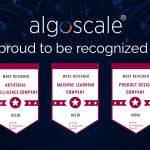Data has emerged as the new currency of every business, and it continues to grow exponentially. With massive volumes of data available to every business, data monetization has become an effective means to extract value from the vast reservoirs of accumulated data.
Several Information Service Providers (ISPs) monetize data by leveraging their expertise and creating meaningful publications. These publications cater to the needs of various consumer groups, including business organizations, professional institutions, students, etc. However, most ISPs can’t take full advantage of the available data. Plenty of data privacy concerns impede the exploration of such information. This is where artificial intelligence (AI) comes into the picture.
AI technology has revolutionized how organizations approach data monetization. AI-powered tools empower several data monetization strategies without threatening user privacy. In today’s blog, we will look at how organizations can unleash the goldmine that is data, leveraging the formidable capabilities of AI.
Understanding Data Monetization
The Data Monetization Market size, currently $4.19 billion in 2023, is anticipated to reach $10.41 billion by 2028, growing at a CAGR of 19.98%.
Data monetization involves generating revenue or other forms of value from the available data sources. Companies can leverage information gathered through business operations, customer interactions, IoT devices, and individual social media to gather valuable insights for future strategies.
The data monetization process encompasses various activities, such as selling data, using it to develop new data-based offerings, or discovering potential markets. Its significance lies in that when harnessed adequately, data can unlock new revenue streams, augment decision-making, improve customer experiences, and drive overall business growth.

The AI Revolution in Data Monetization
91% of leading business organizations are continuously investing in AI initiatives.
The emergence of AI technology has brought about a transformative era in data monetization.
AI technologies such as machine learning and predictive analytics thrive on datasets. AI empowers data monetization strategies by harnessing the full potential of data and unlocking hidden insights.
AI technology can also analyze vast amounts of data at scale. Thus, it allows businesses to identify crucial trends, patterns, and correlations within the data that might not be possible for human data analysts. It leads to more timely and actionable insights, enhancing the value of data assets.
AI plays a critical role in optimizing decision-making processes across different domains. For instance, AI-powered tools can help businesses identify lucrative opportunities, such as personalizing content or products to match individual preferences, predictive pricing, and customer segmentation. Such options enable companies to make the right decisions and increase business sales.
Leveraging AI for Data Enrichment
AI technology facilitates data enrichment by using techniques and algorithms that enhance the quality and usability of raw data.
Data cleansing and standardization
The technology cleanses and standardizes product data, ensuring uniformity and consistency across attributes like titles, descriptions, categorization, and pricing. It helps to eradicate all errors and discrepancies, enabling businesses to maximize the value of their data assets and make informed decisions.
AI-driven data enrichment typically includes the following steps:
- Data cleaning: This involves automatically detecting and correcting errors in data, such as missing values.
- Data refining: Data is then classified into different categories for quick analysis.
- Data enrichment: AI tools can augment existing data with additional information. For instance, it can combine individual customer profiles with their social media handles or purchase histories to achieve a more holistic view of each customer.
Using AI for data enrichment is an essential step in data monetization strategies. AI algorithms can improve the quality of available data, helping businesses make better decisions and devise new monetization opportunities for business growth.
Personalization and Customer Insights
AI utilizes customer data to create personalized offerings. It gathers data about each individual’s needs, preferences, and behaviors, which enables businesses to drive personalized experiences.
AI uses machine learning and data analytics to understand customer behavior. It tracks customer actions, such as purchase history, website visits, content engagement, etc., to reveal trends and patterns. AI algorithms then use these insights to recommend products, services, or content that is highly relevant to each customer.
Example: AI-powered personalization
Companies like Amazon, Spotify, and Netflix use AI to deliver personalized experiences. Amazon, for instance, utilizes an AI-powered recommendation engine that analyzes user purchasing history and browsing habits to offer tailored product recommendations. It increases customer engagement and enables Amazon to generate more significant revenue through indirectly monetizing their data.
Predictive Analytics and Future Trends
When it comes to AI data monetization, there are several ethical and data privacy concerns that surface. The most significant ones are as follows:
- Transparency: Ensuring transparency in AI algorithms is paramount to avoid biased outcomes.
- Data Responsibility: Companies must handle sensitive customer data responsibly, obtaining consent and respecting ownership rights.
- Data Security: Companies must protect data against unauthorized access or malpractice.
Additionally, data privacy regulations such as GDPR and CCPA impose stern requirements on collecting and storing sensitive customer information. Consequently, companies must obtain explicit consent from an individual before collecting their data. They must also make it a point to gather only the necessary information and store it for the minimum required time.
It can help companies ensure transparency and build and maintain customer trust while harnessing the power of AI for data monetization. There are a few more strategies that companies can implement, such as:
- Data anonymization
- Data governance
- Transparent communication
- Third-party audits
The client is a Consumer Product company that faced challenges related to evolving market conditions. The company required a solution that offered continuous insights into consumer demand factors and connected them with opportunities for revenue growth.
To mitigate the issue, Algoscale built an AI-driven RGM tool that streamlined data ingestion and orchestration, leading to easy data analysis. The tool offered automated, data-driven recommendations for strategic decision-making, particularly in pricing and promotions.
The solution offered significant benefits in terms of scalability, usability for market analysis, and adaptability in recommending the best pricing and promotion actions through simulations and optimization.
Conclusion
The importance of AI in data monetization cannot be overstated. This technology has become the foundation, elevating data from a mere asset to a strategic business resource. From identifying complex patterns to personalizing customer journeys and predicting emerging trends, it can help unlock the actual value of data.
At Algoscale, we can guide you on this transformative journey, offering our deep-ranging expertise and experience. Our intelligent AI-powered solutions can enable your business to harness the goldmine of data and achieve significant revenue growth. Contact us today to explore the possibility of AI for data monetization.











